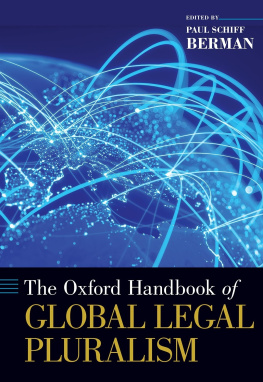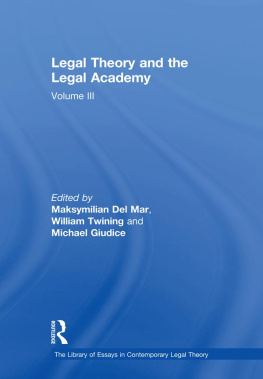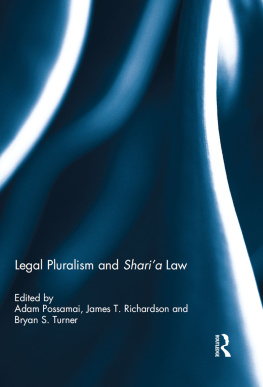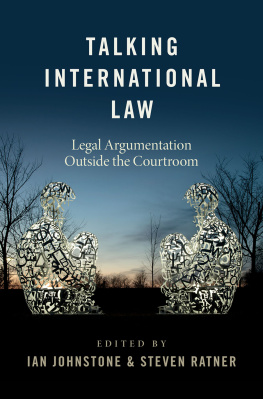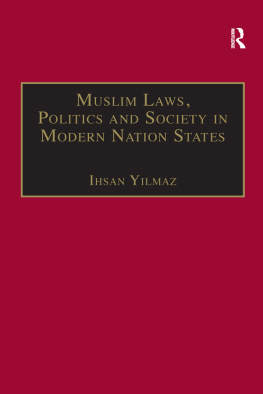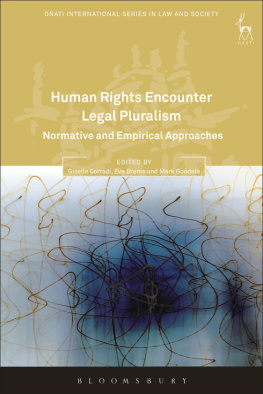The Oxford Handbook of
Global Legal Pluralism

Oxford University Press is a department of the University of Oxford. It furthers the Universitys objective of excellence in research, scholarship, and education by publishing worldwide. Oxford is a registered trade mark of Oxford University Press in the UK and certain other countries.
Published in the United States of America by Oxford University Press 198 Madison Avenue, New York, NY 10016, United States of America.
Oxford University Press 2020
All rights reserved. No part of this publication may be reproduced, stored in a retrieval system, or transmitted, in any form or by any means, without the prior permission in writing of Oxford University Press, or as expressly permitted by law, by license, or under terms agreed with the appropriate reproduction rights organization. Inquiries concerning reproduction outside the scope of the above should be sent to the Rights Department, Oxford University Press, at the address above.
You must not circulate this work in any other form and you must impose this same condition on any acquirer.
Library of Congress Cataloging-in-Publication Data
Names: Berman, Paul Schiff, editor.
Title: The Oxford handbook of global legal pluralism /
edited by Paul Schiff Berman.
Other titles: Global legal pluralism
Description: Oxford : Oxford University Press, [2020] |
Includes bibliographical references and index.
Identifiers: LCCN 2020018937 | ISBN 9780197516744 (hardback) |
ISBN 9780197516768 (epub)
Subjects: LCSH: Legal polycentricity. | Law and globalization.
Classification: LCC K236 .O94 2020 | DDC 340.9dc23
LC record available at https://lccn.loc.gov/2020018937
1 3 5 7 9 8 6 4 2
Printed by Integrated Books International, United States of America
Contents
Understanding Global Legal Pluralism: From Local to Global, from Descriptive to Normative
Paul Schiff Berman
Local People and Global Goings-On: An African Story
Sally Falk Moore
Anthropological Roots of Global Legal Pluralism
Keebet von Benda-Beckmann and Bertram Turner
The Eclipse of Global Legal Pluralism in Ethnology: A French Trajectory
Grgoire Mallard
An Anthropological Perspective on Legal Pluralism
Sally Engle Merry
Empires and Jurisdictional Politics: Legal Pluralism and the Search for Global Order
Lauren Benton
Other Parts of the Forest: Some Aspects of Global Legal Pluralism
Carol Weisbrod
Manifestations and Arguments: The Everyday Operation of Transnational Legal Pluralism
Peer Zumbansen
Does Legal Theory Have a Pluralism Problem?
Cormac Mac Amhlaigh
Theorizing Justice under Conditions of Global Legal Pluralism
Vctor M. Muiz-Fraticelli
Conceptual Theories of Law and the Challenge of Global Legal Pluralism: A Legal Interactionist Approach
Wibren van der Burg
Pluralist Authority and the Relation between Plurality and Pluralism
Nicole Roughan
Global Legal Pluralism and the Rule of Law
David Lefkowitz
Legal Pluralism and the Problem of Evil
Detlef von Daniels
Value Pluralism and Legal Pluralism: Using Radbruchs Value-Based Approach to Law to Understand Global Legal Pluralism
Sanne Taekema
Law Unbounded? The Shifting Stakes in Global Normative Order
Neil Walker
Constitutionalism without Borders and Governance beyond the States: A Comparative Institutional Approach
Miguel Poiares Maduro and Neil Komesar
Transnational Networks and the Construction of Global Law
Oren Perez
Federalism as Legal Pluralism
Erin Ryan
International Law as a System of Legal Pluralism
Frdric Mgret
The Integrative Effects of Global Legal Pluralism
Monica Hakimi
International Criminal Law and Legal Pluralism
Elies van Sliedregt
Cosmopolitan Pluralist Hybrid Tribunals
Elena Baylis
Global Legal Pluralism and Conflict of Laws
Ralf Michaels
Conflicts of Laws Unbounded: The Case for a Legal-Pluralist Revival
Horatia Muir Watt
Global Legal Pluralism and Commercial Law
John Linarelli
Private Uniform Law and Global Legal Pluralism
Gralf-Peter Calliess and Insa Stephanie Jarass
Compliance as an Exchange of Legitimacy for Influence
Kishanthi Parella
The Application of Non-State-Based Standards in International Arbitration
Shahla Ali
E Pluribus Plures: Legal Pluralism and the Recognition of Indigenous Legal Orders
Michael Coyle
Indigenous Rights and Intrastate Multijuridicalism
Dwight Newman
Legal Pluralism and Indigenous Legal Traditions
Kirsty Gover
State Legal Pluralism and Religious Courts: Semi-Autonomy and Jurisdictional Allocations in Pluri-Legal Arrangements
Jaclyn L. Neo
The Future of Religious Arbitration in the United States: Looking through a Pluralist Lens
Michael A. Helfand
Sex Policing in the Arab World
Haider Ala Hamoudi
The Overlapping Web of Data, Territoriality, and Sovereignty
Jennifer Daskal
The Problem of Platform Law: Pluralistic Legal Ordering on Social Media
Molly K. Land
Fighting Fundamentalism with Pluralism: Technologies of Enlightenment during the Arab Spring
Madhavi Sunder
Membership and Global Legal Pluralism
Peter J. Spiro
On the Verge of Citizenship: Negotiating Religion and Gender Equality
Ayelet Shachar
Shahla Ali Professor of Law, Associate Dean, and Deputy Director, Program in Arbitration and Dispute Resolution, The University of Hong Kong
Elena Baylis Professor of Law, University of Pittsburgh
Keebet von Benda-Beckmann Emeritus Professor, Associate, Project Group Legal Pluralism, Department of Anthropology and Law, Max Planck Institute for Social Anthropology
Lauren Benton Barton M. Biggs Professor of History, Yale University
Paul Schiff Berman Walter S Cox Professor of Law, The George Washington University
Wibren van der Burg Professor of Legal Philosophy, Erasmus University
Gralf-Peter Calliess Chair in Private Law, Comparative and International Economic Law, University of Bremen
Michael Coyle Associate Professor of Law, Western University
Detlef von Daniels Visiting Fellow, Centre for International Studies, London School of Economics and Political Science, and Academic Coordinator of the International Justice and Institutional Responsibility Research Group at the Berlin-Brandenburg Academy of Sciences and Humanities
Jennifer Daskal Professor of Law & Faculty Director, Technology, Law and Security Program, American University
Kirsty Gover Professor and Programme Director, Indigenous Peoples in International and Comparative Law, University of Melbourne
Monica Hakimi James V. Campbell Professor of Law, University of Michigan
Haider Ala Hamoudi Professor of Law and Vice Dean of the School of Law, University of Pittsburgh
Michael A. Helfand Professor of Law, Associate Dean for Faculty and Research, and Interim Director, Nootbaar Institute for Law, Religion and Ethics, Pepperdine University
Insa Stephanie Jarass Postdoctoral Researcher, Max Planck Institute for European Legal History
Neil Komesar Miller Professor of Law Emeritus, University of Wisconsin
Molly K. Land Professor of Law, University of Connecticut
David Lefkowitz Professor of Philosophy and the Program in Philosophy, Politics, Economics, and Law, University of Richmond

